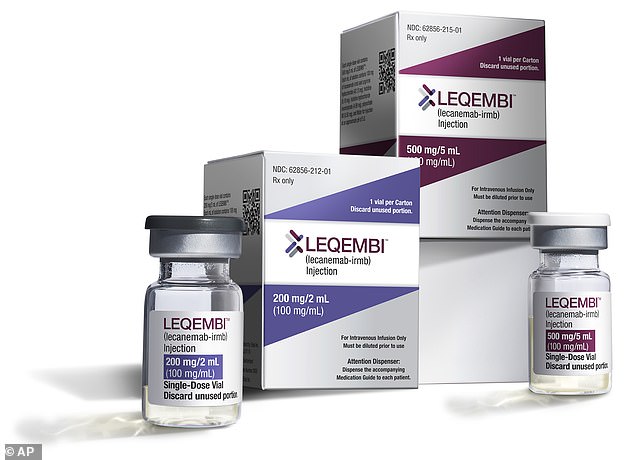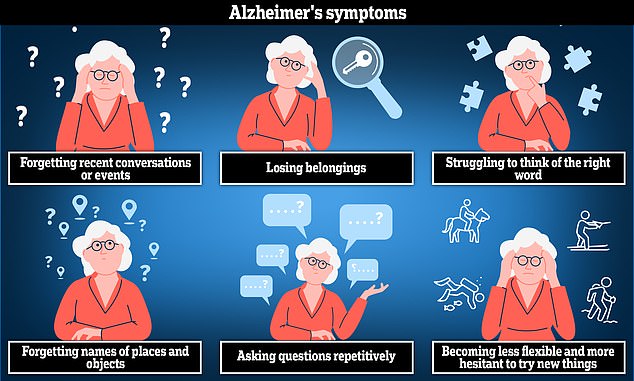New research warns that the Alzheimer’s drug, hailed as a major breakthrough, could even triple the risk of death
An Alzheimer’s drug that was hailed as a major breakthrough could even increase patients’ chances of dying, according to new research.
The treatment, lecanemab, was found to triple the risk of death within a year, compared to people with dementia who were not prescribed the drug.
Previous studies have suggested it slowed the progression of the incurable brain disease by 25 percent, helping patients live healthily for an estimated four to six months longer.
However, earlier this year the NHS spending watchdog, NICE, refused to fund the drug because it offers ‘relatively minor benefits… meaning it cannot be considered valuable’.
And last month the watchdog also rejected donanemab, another drug that had shown promise in suppressing symptoms.
An Alzheimer’s drug hailed as a major breakthrough could actually increase patients’ chances of dying (stock photo)

The treatment, lecanemab, was found to triple the risk of death within a year, compared to people with dementia who were not prescribed the drug (stock photo)
Both lecanemab and donanemab are given as an infusion every two weeks. They work by reducing a toxic protein in the brain called amyloid, which is linked to symptoms of dementia.
Although lecanemab is not available on the NHS, it has been approved by the UK regulator as safe for use and so is available privately to patients at a cost of around £20,000 per year.
However, the new study, using data from America, where the drugs have been used since last year, found the risk of death was significantly higher than reported in the clinical trials.
This equates to 21 additional deaths per 10,000 patients taking lecanemab.
Experts say about 3,000 patients have started using the drug since it was approved by US health officials in July 2023.
Patients taking the drugs are at increased risk of life-threatening swelling and bleeding in the brain.
The experts behind the study warn that “there is precedent for removing drugs if the side effects or mortality signals are concerning.”
Professor Robert Howard, one of the authors of the paper, said: ‘The idea that lecanemab is a miracle cure is not supported by the evidence from the studies. It is even questionable to say that they slow down progression, as that is just an interpretation. Following the NICE decision, these are important findings.’

Experts say about 3,000 patients have started using the drug since it was approved by US health officials in July 2023 (stock photo)

earlier this year the NHS spending watchdog, NICE, refused to fund the drug because it ‘provides relatively small benefits (stock photo)
Prof Howard, an expert in geriatric psychiatry at University College London, added: ‘We must thank NICE for their leadership in this area, evaluating the true costs – small benefits and huge risks of these drugs.
‘Anyone who has the money to pay for lecanemab privately should consider this carefully because the risks are real.’
The research is not currently peer-reviewed and Prof Howard notes that ‘the data is currently preliminary and there is uncertainty about the actual figures’.
The real-world data on the drug’s use in America follows a series of deaths during investigations.
About one in ten study participants experienced swelling in the brain and one in six suffered minor brain hemorrhages, which in rare cases led to life-threatening symptoms.
Three patients died during the trial. One death was confirmed by Dr. Lawrence Honig, a neurologist at Columbia University, New York. A second death was reported by the scientific website Alzforum.
Neither patient has been identified, but Dr. Honig said one patient carried a gene called APOE4, which puts patients at greater risk for brain hemorrhages.
About 15 percent of Alzheimer’s patients carry this gene.

Previous studies have suggested it slowed the progression of the incurable brain disease by 25 percent (stock photo)

Alzheimer’s disease is the most common cause of dementia. The disease can cause anxiety, confusion and short-term memory loss
The Mail on Sunday first reported the third death, that of 79-year-old lecanemab trial participant Genevieve Lane from Florida, who suffered a fatal seizure in 2022 just a week after her third dose.
An autopsy concluded that lecanemab likely triggered the burst blood vessel in her brain that led to her death.
A spokesperson for manufacturer Eisai said: ‘The manuscript posted online contains a warning stating that it ‘should not be considered conclusive, used to inform clinical practice or reported by the media as validated information’.
‘It is also important to note that this data has not undergone peer review nor has it been published in a journal.
‘Data presented at recent medical meetings demonstrate that lecanemab reports received to date are consistent with the safety profile observed in
the clinical development program and are under ongoing review by the FDA (U.S. Food and Drug Administration) and Eisai’s pharmacovigilance team.”
